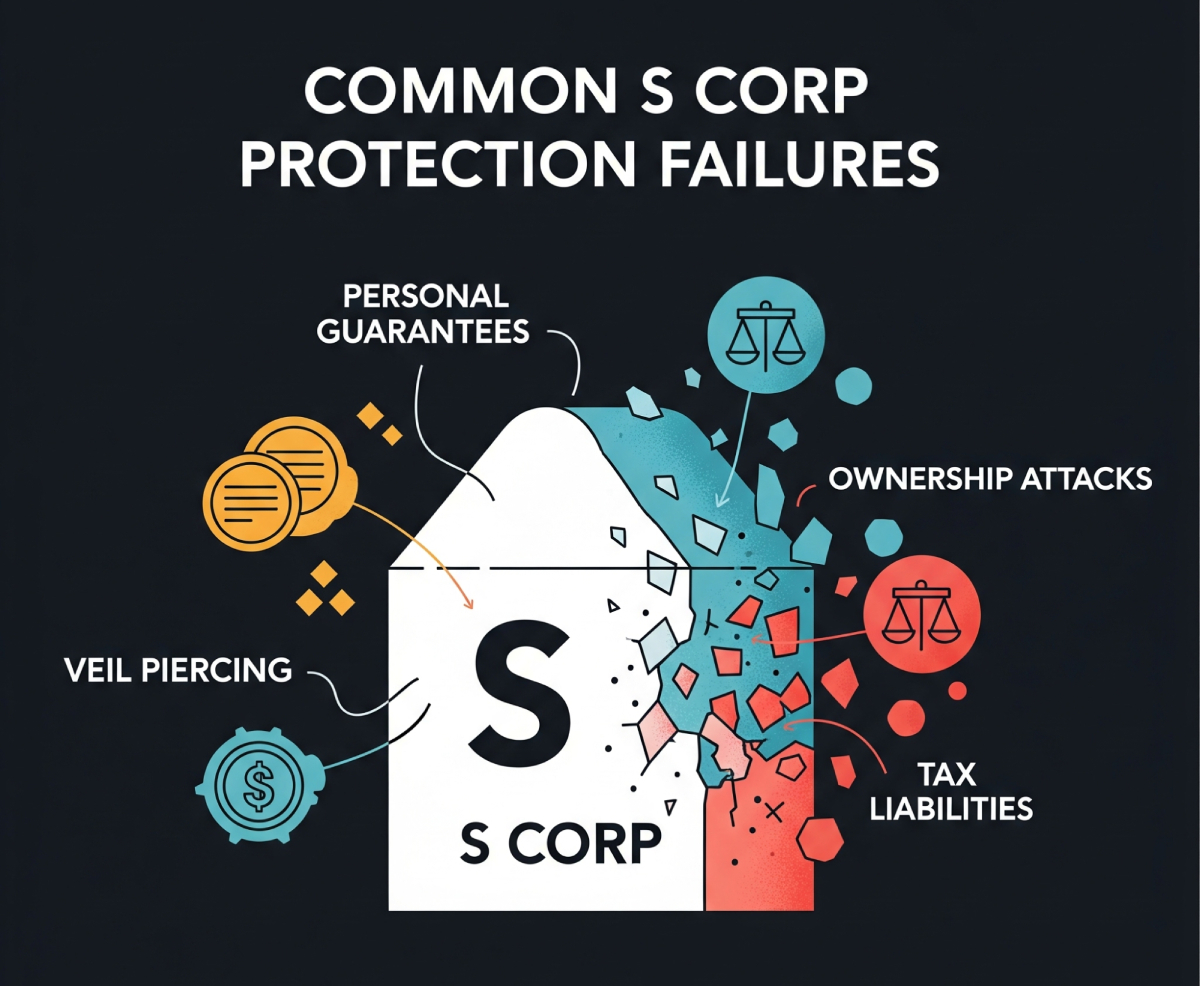Quick Summary
While an S Corporation can shield you from some business liabilities, it leaves gaps that may expose your wealth. We break down those risks and offer alternative strategies, including LLCs and trusts. You can find more insights and guides on asset protection in our blog.
Wondering if Your S Corporation Protects Your Assets?
Like many successful entrepreneurs and professionals, you may have set up an S Corporation thinking it would protect your personal assets from legal threats.
But here’s the hard truth: many business owners only discover the limits of that protection after they are sued. And by then, it is often too late to make changes.
In this Blake Harris Law article, we explain what S Corporation protection covers, where its protections fall short, and how to build stronger defenses for your personal assets.
But first…
Why Listen to Us?
At Blake Harris Law, asset protection is our sole focus. We help clients across the United States and internationally protect their wealth using proven legal structures, including LLCs, trusts, and corporate entities. As attorneys specializing in asset protection, we understand when S Corporations provide real protection and when additional strategies become necessary to safeguard personal assets.
What Is an S Corporation?
An S Corporation is not a separate legal entity. Instead, it is a tax election made by an existing corporation or LLC. When a company elects S Corporation status with the IRS, income and losses pass through to its shareholders. This avoids double taxation at the corporate level.
How It Differs from an LLC or C Corporation
S Corporations have specific requirements and restrictions that distinguish them from other business structures:
- Maximum 100 shareholders
- All shareholders must be U.S. citizens or residents
- Only one class of stock allowed
- Required shareholder meetings and detailed corporate records
LLCs offer more flexibility with fewer formal requirements. C Corporations face double taxation but allow unlimited shareholders and multiple stock classes.
Does S Corp Protect Personal Assets?
Yes, when structured and maintained properly, an S Corporation can offer personal liability protection. This is one of the primary reasons business owners elect S Corporation status. It creates a legal separation between personal wealth and business operations, shielding your personal assets from the company’s debts and legal liabilities.
How Does This Work?
An S Corporation operates as a separate legal entity. When the company faces lawsuits or debts, creditors are limited to pursuing only the company’s assets. Personal property stays protected unless you personally guarantee a loan or fail to maintain corporate formalities.
Example: Suppose your S Corporation faces a contract dispute worth $500,000. If corporate formalities are maintained, creditors can only access the corporation’s assets. Your personal home, savings, and cryptocurrency remain protected.
Note: The liability protection offered by an S Corporation is only as strong as your adherence to required formalities. Courts may “pierce the corporate veil” and hold you personally liable if the company is not properly maintained. To preserve protection, you must:
- Keeping separate business and personal bank accounts
- Maintaining detailed financial records and tax filings
- Issuing stock certificates
- Holding board meetings and documenting minutes
- Clear separation of business and personal expenses
Need stronger protection? At Blake Harris Law, we help high-net-worth individuals build layered asset protection strategies that go beyond corporate structures, offering true peace of mind.
The Limitations of S Corps for Protecting Personal Assets
While an S Corporation can provide a layer of liability protection, it is far from bulletproof. There are several common scenarios where your personal wealth may still be at risk.
Courts Can Pierce the Corporate Veil
As mentioned earlier, when S Corps are not treated as separate entities, courts disregard the structure. This happens in cases involving:
- Mixed business and personal finances
- Missing or incomplete corporate records
- Failure to follow the required formalities
- Undercapitalization or fraudulent activities
Personal Guarantees Eliminate Protection
Signing personal guarantees for a lease, loan, or contract removes the very protection the S Corp was meant to provide. Creditors can bypass the corporate shield and go directly after your personal assets.
Example: You personally guarantee a lease for your S Corp’s equipment loan. If the business defaults, the lender pursues your personal assets directly, bypassing corporate protection.
Your Ownership Interest Can Be Targeted
An S Corp protects your personal assets from business liabilities, but not business interests from personal liabilities. If you are sued personally, your shares in the S Corporation may be exposed. Your ownership shares can be targeted in:
- Divorce proceedings
- Personal debt collection
- Professional liability claims
- Tax obligations
This gives the creditor partial ownership, which may include voting rights and decision-making power, disrupting the company’s control and direction.
Tax and Regulatory Exceptions
Certain government agencies are not bound by corporate protections. You can be held personally liable for:
- Unpaid payroll taxes (100% personal liability)
- Environmental violations
- Regulatory compliance failures
- Fraudulent activities
This is where legal strategies from Blake Harris Law can help shield high-value ownership interests, especially when personal liability puts business control at risk.
Stronger Alternatives for Personal Asset Protection
For high-net-worth individuals, particularly those with legal exposure or cross-border assets, S Corporations alone are not sufficient. These alternatives provide deeper protection, privacy, and control.
Offshore Trusts: The Highest Standard in Asset Protection
Offshore asset protection trusts, particularly those based in jurisdictions like the Cook Islands, Nevis, or Belize, provide the strongest available protection. These jurisdictions do not recognize U.S. court judgments, requiring creditors to file a new lawsuit under foreign law.
Benefits include:
- Legal insulation from U.S. court orders
- Higher burden of proof for creditors
- Stronger privacy protections
- Asset control retained through a trusted trustee relationship
For example, a business owner facing a personal lawsuit can protect their assets by working with Blake Harris Law to establish a Cook Islands Trust. Even if a U.S. court awards a judgment, the creditor must retain local counsel and file a new case in the Cook Islands, an expensive and complex process with low odds of success.
Limited Liability Company (LLC)
An LLC offers stronger asset protection features than an S Corporation, especially when part of a larger strategy:
- Charging Order Protection: Your personal creditors can’t seize LLC assets. They can’t force distributions. They only get what the LLC chooses to distribute. This creates a strong barrier.
- Flexible Ownership Structures: LLCs allow for diverse ownership arrangements, including ownership by trusts. This helps with asset protection strategies.
- Reduced Formalities: LLCs have fewer ongoing compliance requirements. This can reduce administrative burden and compliance risks for owners.
- Multi-Member Structures: More members strengthen protection, making it harder for creditors to get through.
For maximum security, an LLC is most effective when owned in offshore trusts. At Blake Harris Law, we help clients integrate LLCs into customized asset protection plans, often using jurisdictions like Nevis to enhance privacy and creditor resistance.
Domestic Asset Protection Trusts (DAPTs): U.S.-Based Options
A Domestic Asset Protection Trust (DAPT) is an irrevocable trust in states like Nevada, Alaska, or Delaware, designed to protect personal assets from future creditors. However, because they operate within the U.S. legal system, they face important considerations that can impact their effectiveness.
- Courts in other states may not honor the trust
- Trusts formed close to a legal claim may be invalidated
- Fraudulent conveyance allegations can undermine protection
Example: If you establish a Nevada DAPT, but live in California. A California court might decline to honor the trust’s protections, especially if the claim involves a California resident or dispute.
Layering Protective Strategies
The strongest asset protection combines multiple structures across jurisdictions. By using multiple layers, you can isolate risk, complicate legal access, and increase both time and cost for any creditor trying to reach your assets.
A typical layered structure might look like this:
- Operating Level: Nevis LLC holds business assets and operations
- Ownership Level: Cook Islands Trust owns the LLC
- Control Level: Independent trustee manages distributions
- Privacy Level: Nominee services maintain confidentiality
Benefits of Layering:
- Jurisdictional insulation
- Separation of ownership and control
- Deterrence through legal and financial obstacles
Example: A real estate investor holds $5 million in properties through a Nevis LLC owned by a Cook Islands Trust. Personal creditors cannot access properties, force distributions, or control operations.
Strengthen Your Asset Protection Strategy with Blake Harris Law
Many business owners assume an S Corporation will shield them from every legal and financial threat, but that is not always the case. While it offers a layer of protection, it leaves significant gaps that could expose your personal wealth, especially in high-risk or high-net-worth situations.
At Blake Harris Law, we help clients close those gaps with tailored asset protection plans that go beyond entity formation. Whether you are looking to safeguard your assets using offshore trusts in the Cook Islands, Nevis, or Belize, or integrate LLCs and other legal tools, our team will design a structure that offers maximum security and long-term control, including protection for assets like cryptocurrency.
If you are serious about protecting your business, property, and wealth, contact Blake Harris Law today.





